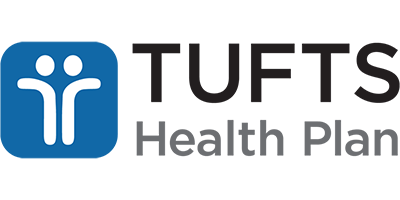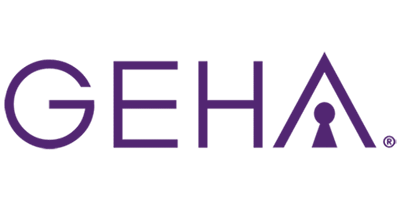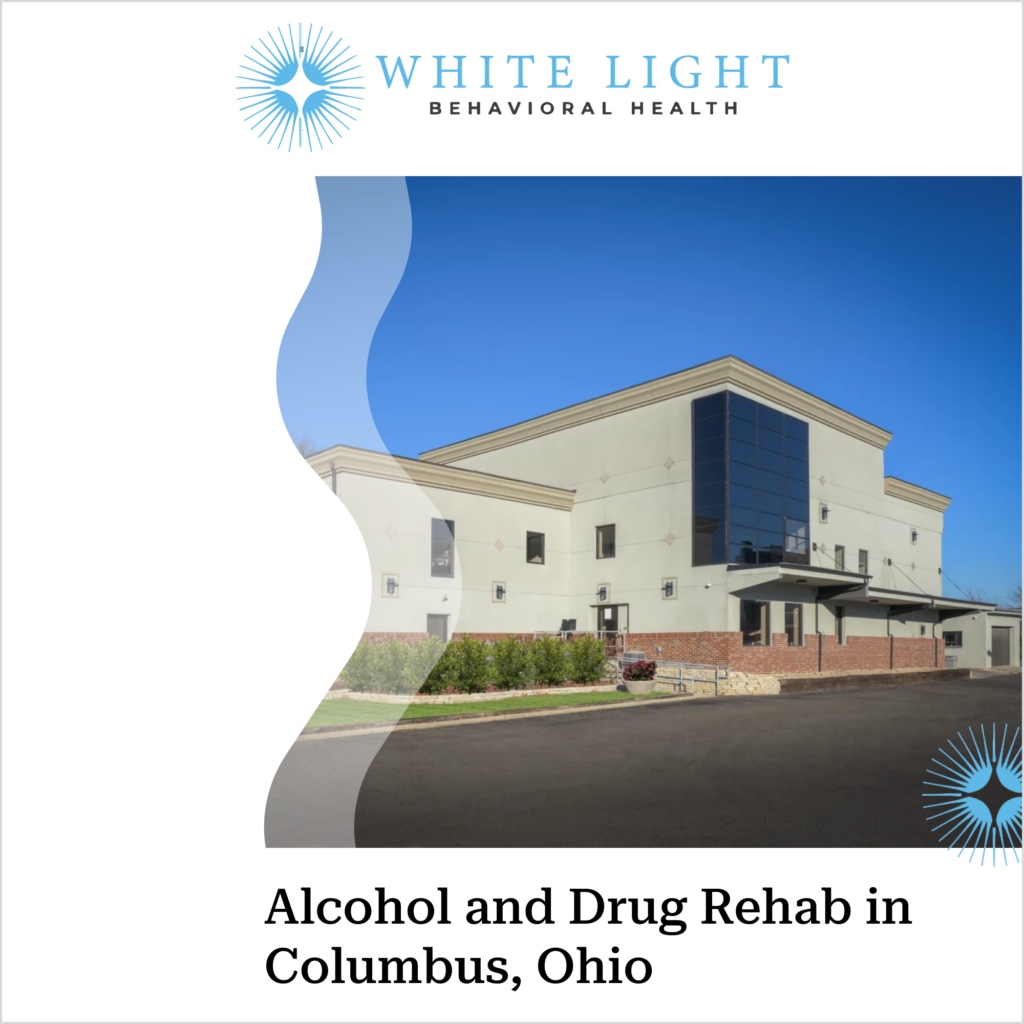Caffeine Addiction: Symptoms, Causes, Effects, Treatments, and Prevention.
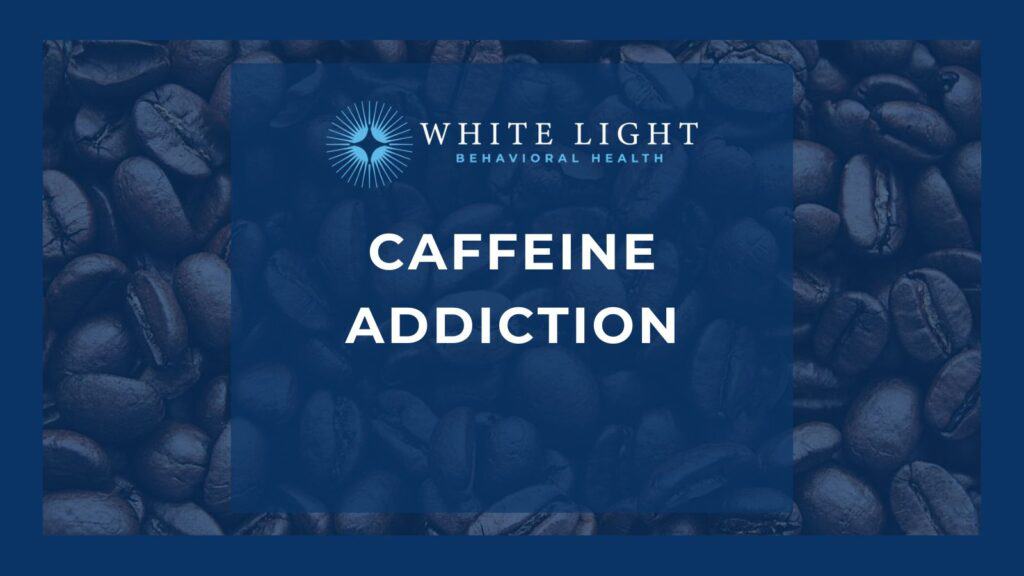
Caffeine addiction, or caffeine use disorder, involves compulsive consumption despite negative health effects. It arises from caffeine’s stimulating effects, leading to tolerance and withdrawal symptoms. As per a study done by Kent State University, Ohio, 92% of college students regularly consume caffeinated products, often lacking awareness of potential health hazards while seeking to stay awake and improve performance.
Symptoms of caffeine addiction include increased tolerance, headaches, and difficulty controlling intake, impacting work and social life.
Causes of caffeine addiction include genetic factors, metabolism rates, and mental health conditions like anxiety. High stress and cultural norms also contribute.
Effects of caffeine addiction include cardiovascular risks, gastrointestinal issues, and worsened anxiety, affecting quality of life.
Caffeine addiction treatment includes gradual reduction, behavioral therapy (CBT), support groups, medication for withdrawal symptoms, lifestyle changes, nutritional counseling, and alternative therapies like mindfulness.
Preventing caffeine addiction requires awareness of risks and promoting moderation, along with healthy coping mechanisms and balanced lifestyles.
Is Caffeine Addictive?
Yes, caffeine is addictive. Caffeine addiction is a significant concern due to its widespread use and potential for dependence.
Approximately 90% of adults in the United States consume caffeine regularly, according to Knapik, J. J. et al. 2022, “Prevalence of caffeine consumers, daily caffeine consumption, and factors associated with caffeine use among active duty United States military personnel,” reflecting its prevalence in modern society. Caffeine is the most commonly used psychoactive drug globally, and heavy use leads to physical dependence and withdrawal symptoms such as headaches, fatigue, and irritability.
Did you know most health insurance plans cover substance use disorder treatment? Check your coverage online now.
What Is Caffeine?
Caffeine is a naturally occurring central nervous system (CNS) stimulant of the methylxanthine class. It is the most widely taken psychoactive stimulant globally in various foods and beverages.
More Resources on Addiction:
While natural caffeine is derived from sources like coffee, tea, and chocolate, synthetic caffeine is produced in laboratories and added to many products. Despite slight differences in their effects on the body, both types of caffeine have similar physiological impacts.
Understanding the distinctions between natural and synthetic caffeine is essential for consumers and manufacturers alike.
How Much Caffeine Is Too Much?
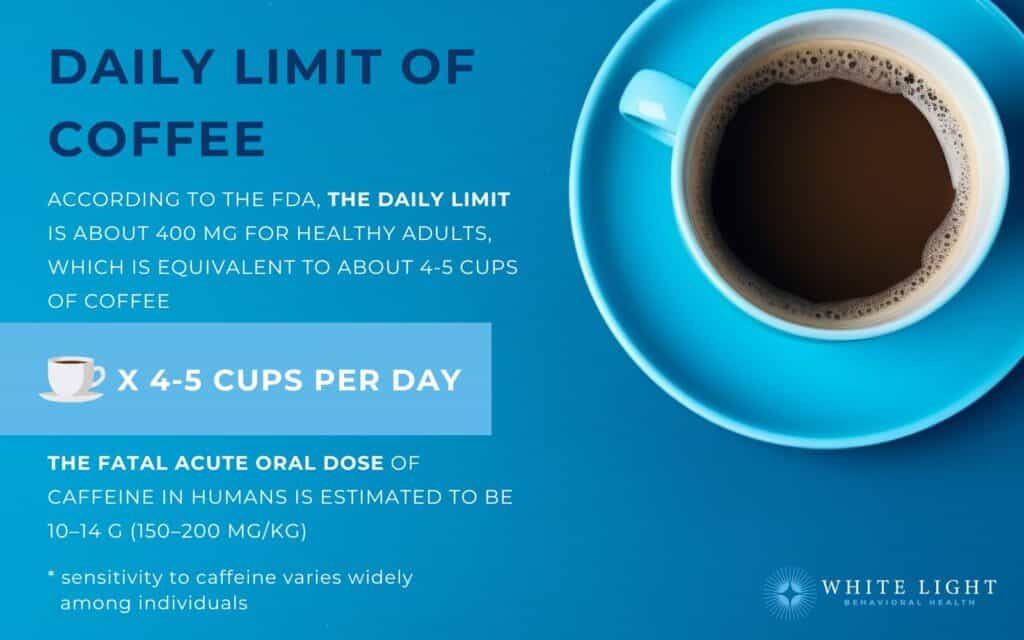
400mg caffeine is too much caffeine for most healthy adults according to FDA guidelines, though individual tolerance varies based on factors such as age, weight, and overall health. This daily limit is equivalent to roughly four to five cups of coffee, but sensitivity to caffeine varies widely among individuals.
The fatal acute oral dose of caffeine in humans is estimated to be 10–14 g (150–200 mg/kg), as discussed in 4- Safety of Caffeine Usage, Caffeine for the Sustainment of Mental Task Performance: Formulations for Military Operations, 2001. Monitoring caffeine intake from all sources, including coffee, tea, energy drinks, and certain medications, is essential to avoid excessive consumption.
What Are The Signs And Symptoms Of Caffeine Addiction?
The signs and symptoms of caffeine addiction are physical dependence, increased anxiety, risk of heart disease, high blood pressure, osteoporosis, impact on sleep patterns, psychological dependence and cravings, tolerance development, and mood changes and irritability.
Here are the signs and symptoms of caffeine addiction in detail below:
1. Physical Dependence
One of the hallmark signs of caffeine addiction is physical dependence, where the body becomes reliant on regular caffeine intake to function normally. According to Griffiths, R. R. et al. 2000, “Caffeine as a model drug of dependence: Recent developments in understanding caffeine withdrawal, the caffeine dependence syndrome, and caffeine negative reinforcement,” suggest that 9% to 30% percent of caffeine consumers are caffeine dependent according to DSM-IV criteria.
When caffeine consumption is reduced or stopped abruptly, withdrawal symptoms emerge. These symptoms often include headaches, fatigue, irritability, and difficulty concentrating. The severity of withdrawal symptoms varies depending on factors such as the level of caffeine dependence and individual tolerance.
2. Increased Anxiety
Increased caffeine consumption leads to jitteriness, nervousness, and elevated heart rate, making anxiety symptoms more pronounced.
Individuals with anxiety disorders are particularly sensitive to the effects of caffeine, which exacerbates symptoms of anxiety. Managing caffeine intake is necessary for individuals with anxiety disorders to prevent worsening symptoms and potential addiction.
Contact us today to schedule an initial assessment or to learn more about our services. Whether you are seeking intensive outpatient care or simply need guidance on your mental health journey, we are here to help.
3. Risk of Heart Disease, High Blood Pressure, and Osteoporosis
Heavy caffeine consumption has been linked to an increased risk of certain health conditions, including heart disease, high blood pressure, and osteoporosis. According to Wilson, P. W. F. et al. 2016, “Caffeine consumption and cardiovascular risks: Little cause for concern,” elevated caffeine intake raises blood pressure and heart rate, potentially contributing to cardiovascular issues over time.
Moreover, caffeine interferes with calcium absorption, which impacts bone health and increases the risk of osteoporosis, particularly in individuals with inadequate calcium intake, as discussed by Heaney, R. P. et al. 2002, “Effects of caffeine on bone and the calcium economy.”
4. Impact on Sleep Patterns
Caffeine addiction disrupts sleep patterns and contributes to insomnia or poor sleep quality.
According to Weibel, J., & Lin, Y.-S. et al. 2021, “The impact of daily caffeine intake on nighttime sleep in young adult men,” acute caffeine intake delays sleep initiation and reduces sleep intensity, especially when consumed later in the day. It interferes with the body’s natural sleep-wake cycle, making falling or staying asleep difficult.
Chronic sleep disturbances resulting from caffeine addiction have negative effects on overall health and well-being, including increased daytime fatigue and impaired cognitive function.
5. Psychological Dependence and Cravings
Caffeine addiction involves psychological dependence, characterized by cravings for caffeine and reliance on it to feel alert or function effectively.
Individuals experience compulsive consumption and difficulty cutting back on caffeine intake despite awareness of its negative effects. Caffeine cravings are triggered by various factors, including stress, fatigue, and environmental cues associated with caffeine consumption.
6. Tolerance Development
Regular caffeine consumption leads to the development of tolerance, where individuals require higher doses of caffeine to achieve the desired level of alertness or stimulation.
Tolerance develops as the body adapts to caffeine and becomes less responsive to its effects. This tolerance drives escalating caffeine consumption and increases the risk of addiction as individuals seek to maintain the desired level of alertness or counteract withdrawal symptoms.
7. Mood Changes and Irritability
Caffeine addiction influences mood and emotional well-being, resulting in mood changes and irritability, especially during caffeine withdrawal.According to Dews, P. B. et al. 2002, “Caffeine: behavioral effects of withdrawal and related issues,” abrupt reduction or cessation of caffeine intake triggers mood swings, irritability, and feelings of agitation or restlessness. These symptoms disrupt daily functioning and social interactions, highlighting the psychological impact of caffeine addiction on overall mental health.
Rediscover Life at White Light Behavioral Health
Get the compassionate support you deserve. We're here to help you reclaim joy, wellness, and a brighter future.
Our Facility
What Are The Effects Of Caffeine Addiction?
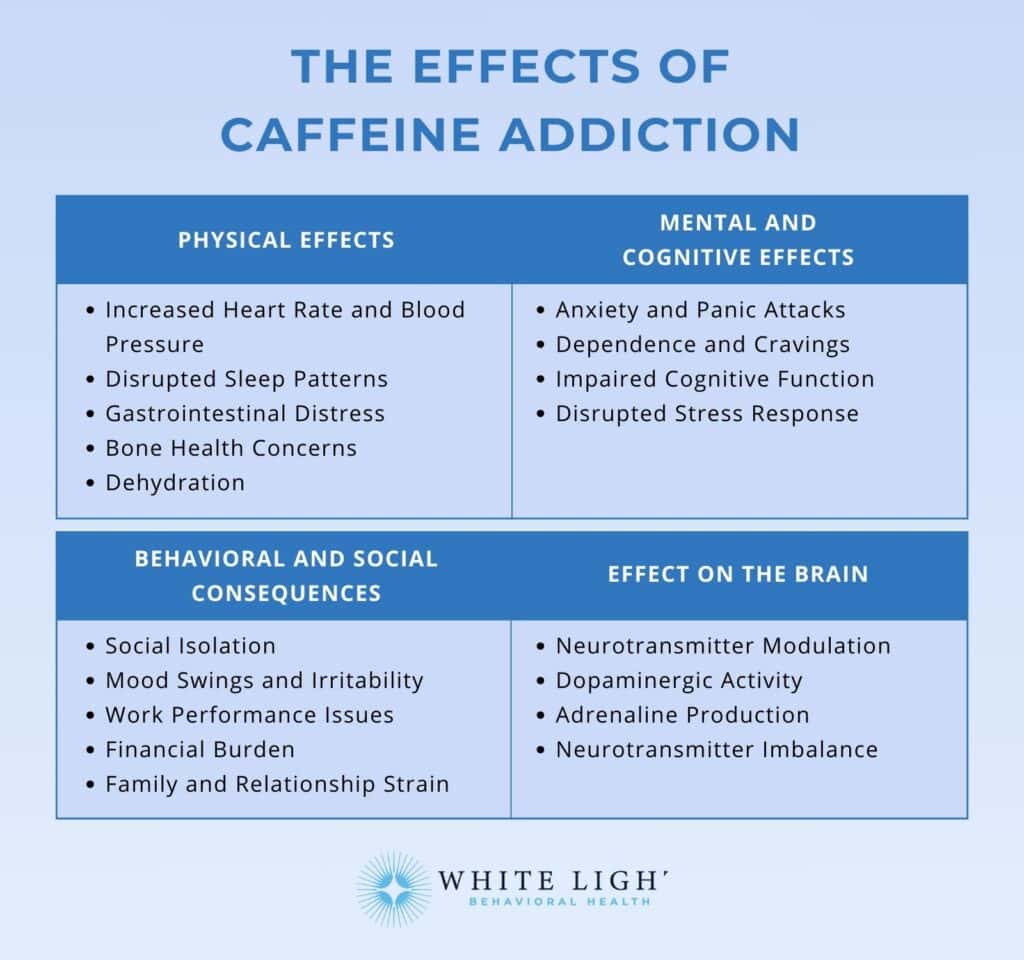
The effects of caffeine addiction include physical effects such as increased heart rate and blood pressure, disrupted sleep, and gastrointestinal issues. Mental and cognitive effects encompass anxiety, dependence, and impaired cognitive function. Behavioral and social consequences include mood swings, work performance issues, and relationship strain.
Here are the key effects of caffeine addiction in detail below:
Physical Effects Of Caffeine Addiction
Caffeine addiction adversely affects physical health in several ways, including:
- Increased Heart Rate and Blood Pressure: Heavy caffeine consumption leads to elevated heart rate and blood pressure, according to Sun Ha Jee et al. 1999, “Hypertension Journal,” contributing to cardiovascular issues such as heart disease and hypertension.
- Disrupted Sleep Patterns: Caffeine addiction disturbs sleep patterns, leading to difficulties falling asleep, staying asleep, or achieving restful sleep. As discussed by Clark, I., & Landolt, H. P. et al. 2017, “Coffee, caffeine, and sleep: A systematic review of epidemiological studies and randomized controlled trials,” chronic sleep disturbances result in fatigue, impaired cognitive function, and an increased risk of accidents or injuries.
- Gastrointestinal Distress: Excessive caffeine intake causes gastrointestinal issues such as acid reflux, stomach ulcers, and irritable bowel syndrome (IBS).
Caffeine stimulates gastric acid secretion and exacerbates existing digestive conditions. - Bone Health Concerns: Prolonged caffeine addiction negatively impacts bone health and increases the risk of osteoporosis, particularly in individuals with inadequate calcium intake, as discussed by Berman, N.K., & Honig, S. et al. 2022, “The effects of caffeine on bone mineral density and fracture risk.” Caffeine interferes with calcium absorption, potentially reducing bone density and increasing fracture risk.
- Dehydration: Caffeine has diuretic properties that increase urine production and contribute to dehydration, especially when consumed in large quantities. Dehydration leads to symptoms such as thirst, dry mouth, dizziness, and fatigue.
Mental And Cognitive Effects of Caffeine
Caffeine addiction influences psychological well-being and behavior, leading to:
- Anxiety and Panic Attacks: Excessive caffeine consumption exacerbates symptoms of anxiety disorders, leading to increased nervousness, jitteriness, and panic attacks, according to Klevebrant, L., & Frick, A. et al. 2022, “Effects of caffeine on anxiety and panic attacks in patients with panic disorder: A systematic review and meta-analysis.” Caffeine stimulates the release of stress hormones such as cortisol and adrenaline, which worsen anxiety symptoms.
- Dependence and Cravings: Caffeine addiction often involves psychological dependence, characterized by cravings for caffeine and compulsive consumption. Individuals experience strong urges to consume caffeine to alleviate withdrawal symptoms or maintain alertness, leading to a cycle of dependence and reinforcement.
- Impaired Cognitive Function: According to McLellan, T. M., & Caldwell, J. A., et al. 2016, “A review of caffeine’s effects on cognitive, physical, and occupational performance,” chronic caffeine consumption impairs cognitive function, including memory, concentration, and decision-making abilities.
Prolonged caffeine addiction often leads to cognitive decline and decreased overall mental performance. - Disrupted Stress Response: Long-term caffeine addiction disrupts the body’s stress response system, making individuals more susceptible to stress-related health problems. Chronic activation of the body’s stress response contributes to adrenal fatigue, exhaustion, and burnout.
Behavioral And Social Consequences Of Caffeine Use
Caffeine addiction impacts social interactions and interpersonal relationships, leading to:
- Social Isolation: Individuals prioritize caffeine over social activities or relationships, leading to social withdrawal and isolation. Excessive caffeine intake interferes with normal social functioning and participation in social events.
- Mood Swings and Irritability: Abrupt reduction or cessation of caffeine intake triggers mood swings, irritability, agitation, or restlessness.
Individuals experience heightened emotional sensitivity and difficulty regulating mood.
- Work Performance Issues: Caffeine addiction affects work performance and productivity due to sleep disturbances, mood fluctuations, and cognitive impairment. Individuals often struggle to concentrate, meet deadlines, or perform tasks effectively, leading to job-related stress and dissatisfaction.
- Financial Burden: Maintaining a caffeine addiction is costly, especially if individuals regularly purchase caffeinated beverages or supplements.
Excessive spending on caffeine-related products strains personal finances and contributes to financial stress or debt. - Family and Relationship Strain: Caffeine addiction creates tension and conflict within families and intimate relationships, particularly if one partner’s caffeine consumption disrupts household routines or causes disagreements over spending priorities.
Communication breakdowns and resentment arise as a result of caffeine-related issues.
How Does Caffeine Affect The Brain?
Caffeine affects the brain by acting as a central nervous system stimulant, primarily by blocking adenosine receptors, which normally promote relaxation and sleepiness. This blockade increases neural activity, leading to heightened wakefulness and alertness.
Further, caffeine enhances dopamine release, contributing to feelings of pleasure and improved mood, which reinforces its use and leads to potential addiction.
Chronic caffeine consumption disrupts neurotransmitter balance, causing adaptive changes in receptor sensitivity and resulting in tolerance and withdrawal symptoms, manifesting as brain fog when caffeine is not consumed. In teenagers, caffeine stimulates adrenaline release, increasing heart rate and alertness, impacting their developing brains and leading to heightened anxiety or stress responses.
Are you covered for treatment?
White Light Behavioral Health is an approved provider for Blue Cross Blue Shield and TUFTS, while also accepting many other major insurance carriers.
Check Coverage Now!What Causes Caffeine Addiction?
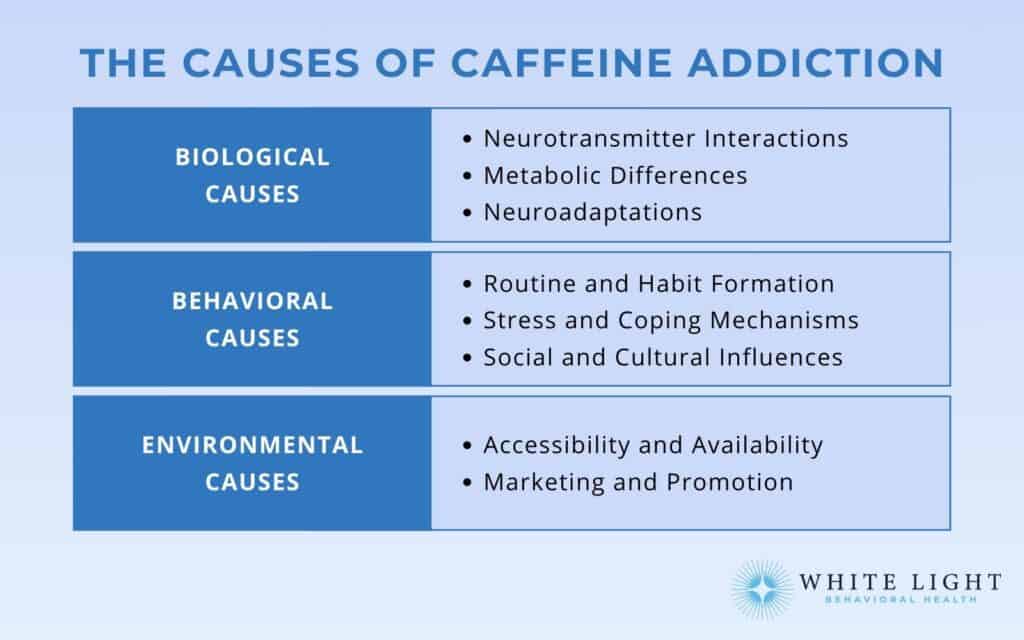
Genetic factors, metabolism rates, mental health conditions like anxiety, high stress, and cultural norms cause Caffeine Addiction.
Here are the causes of caffeine addiction broken into biological, behavioral, and environmental factors in detail below:
Biological Causes of Caffeine Addiction
- Neurotransmitter Interactions: Caffeine affects the brain by interacting with neurotransmitter systems, particularly adenosine and dopamine. Genetic variations in adenosine or dopamine receptor genes influence individual responses to caffeine and predispose some individuals to develop caffeine dependence.
- Metabolic Differences: Variability in caffeine metabolism influences susceptibility to addiction.
According to Fulton, J. L., et al. (2018), “Impact of Genetic Variability on Physiological Responses to Caffeine in Humans: A Systematic Review,” genetic polymorphisms in enzymes responsible for caffeine metabolism, such as cytochrome P450 1A2 (CYP1A2), influence the rate at which caffeine is metabolized in the body. Individuals with slower caffeine metabolism experience prolonged stimulant effects, increasing the risk of dependence.
- Neuroadaptations: Chronic exposure to caffeine leads to neuroadaptations in the brain, altering receptor sensitivity and neurotransmitter release.
Over time, the brain becomes desensitized to caffeine’s effects, requiring higher doses to achieve the same stimulation level. These neuroadaptations contribute to tolerance and withdrawal symptoms upon cessation of caffeine consumption.
Behavioral Causes of Caffeine Addiction
- Routine and Habit Formation: Regular consumption of caffeinated beverages as part of daily routines or rituals contributes to the development of caffeine addiction.
Habitual behaviors, such as reaching for a cup of coffee upon waking or during breaks, reinforce the association between caffeine intake and perceived benefits, making it challenging to reduce consumption. - Stress and Coping Mechanisms: Caffeine consumption is a coping mechanism for managing stress or fatigue.
Individuals facing high stress levels or demanding workloads rely on caffeine to enhance alertness and productivity. The temporary relief provided by caffeine reinforces its use as a stress management strategy, potentially leading to chronic consumption and dependence.
- Social and Cultural Influences: Societal norms and cultural practices surrounding caffeine consumption influence patterns of use and addiction.
In cultures where coffee or tea drinking is deeply ingrained in social interactions or workplace environments, peer pressure and social acceptance contribute to higher levels of caffeine consumption. Additionally, advertising and media portray caffeine as a desirable and socially acceptable substance, influencing perceptions and behaviors related to caffeine use.
Environmental Causes of Caffeine Addiction
- Accessibility and Availability: The widespread availability of caffeinated products, including coffee, tea, energy drinks, and sodas, makes it easy for individuals to access and consume caffeine regularly.
Convenience stores, coffee shops, and vending machines offer quick and convenient access to caffeinated beverages, facilitating habitual consumption and potential addiction.
- Marketing and Promotion: Aggressive marketing tactics by beverage companies promoting the benefits of caffeine, such as increased energy and alertness, contribute to higher consumption levels and addiction. Clever advertising campaigns targeting specific demographics, such as young adults or athletes, reinforce associations between caffeine consumption and desirable outcomes, encouraging continued use.
What Are The Withdrawal Symptoms Of Caffeine?
Withdrawal symptoms of caffeine are headaches (typically throbbing), fatigue, lethargy, decreased energy, mood swings, irritability, difficulty concentrating, anxiety, depression, and flu-like symptoms.
Here are the caffeine withdrawal symptoms explained in a table below:
Individuals experience a significant decrease in energy levels and motivation, making it challenging to perform daily tasks. Individuals struggle to stay focused, and experience lapses in attention, affecting their ability to perform tasks that require mental clarity. Individuals experience heightened sensitivity to stressors and find it difficult to relax or unwind, contributing to discomfort. These symptoms manifest as generalized body aches or specific muscle tension and contribute to feelings of physical discomfort and decreased mobility.Withdrawal Symptoms Description Headache Headache, typically throbbing Headaches are one of the most common withdrawal symptoms associated with caffeine cessation. They often present as throbbing pain ranging from mild to severe, lasting several days. Fatigue Fatigue, lethargy, decreased energy Caffeine withdrawal leads to feelings of fatigue and lethargy as the body adjusts to the absence of caffeine stimulation. Irritability Mood swings, irritability Changes in mood, including irritability, agitation, and mood swings, are common during caffeine withdrawal. Individuals feel more easily frustrated or annoyed, leading to interpersonal conflicts and difficulty managing emotions. Difficulty Concentrating Poor concentration, mental fog Caffeine withdrawal impairs cognitive function, resulting in difficulty concentrating, poor memory, and mental fog. Depressed Mood Feelings of sadness or depression Some individuals experience symptoms of depression during caffeine withdrawal, including feelings of sadness, hopelessness, or low mood. These mood changes are distressing and interfere with daily functioning and overall well-being. Anxiety Feelings of nervousness or anxiety Anxiety is a common withdrawal symptom characterized by feelings of nervousness, restlessness, or worry. Nausea Upset stomach, nausea Gastrointestinal symptoms, such as upset stomach and nausea, often occur during caffeine withdrawal. These symptoms range from mild discomfort to more pronounced nausea or gastrointestinal distress. Muscle Pain/Stiffness Muscle aches, stiffness Some individuals report muscle pain and stiffness during caffeine withdrawal. Flu-like Symptoms Body aches, fever, chills Some individuals experience flu-like symptoms, such as body aches, fever, and chills, during caffeine withdrawal. These symptoms mimic a viral infection and include fatigue, malaise, and overall feelings of unwellness.
Did you know most health insurance plans cover substance use disorder treatment?
What Are The Treatment Options For Caffeine Addiction in Ohio?
Treatment options for caffeine addiction in Ohio include opting for behavioral therapies, reduction of caffeine intake, lifestyle changes, medication, and nutritional counseling.
Here are the treatment options for caffeine addiction in Ohio:
1. Gradual Reduction of Caffeine Intake
Gradually reducing caffeine intake over time minimizes withdrawal symptoms and facilitates a smoother transition to lower consumption levels. This approach involves gradually tapering down caffeine intake by reducing the amount consumed daily or per week until reaching a desired lower level or complete cessation.
2. Behavioral Therapies
Behavioral therapies, such as cognitive-behavioral therapy (CBT), are effective in treating caffeine addiction by addressing underlying psychological factors and helping individuals develop coping strategies to manage cravings and withdrawal symptoms. According to James, J., & Stirling, K. P. et al. 1985, “Caffeine fading: Behavioral treatment of caffeine abuse,” CBT involves identifying triggers for caffeine consumption, challenging irrational beliefs about caffeine use, and learning healthier ways to cope with stress and fatigue.
3. Support Groups and Counseling
Joining support groups or seeking individual counseling provides valuable emotional support and practical guidance for individuals struggling with caffeine addiction.
These groups offer a supportive environment where individuals share their experiences, receive encouragement, and learn from others who have successfully overcome caffeine addiction. Professional counseling also helps individuals explore the root causes of their addiction and develop personalized strategies for recovery.
4. Medication
In some cases, healthcare providers prescribe medications to help manage withdrawal symptoms or address co-occurring conditions, such as anxiety or depression, that contribute to caffeine addiction. Medications such as antidepressants or anti-anxiety drugs are often used to alleviate symptoms and support recovery.
Contact us today to schedule an initial assessment or to learn more about our services. Whether you are seeking intensive outpatient care or simply need guidance on your mental health journey, we are here to help.
5. Lifestyle Modifications
Lifestyle modifications, such as improving sleep hygiene, adopting stress-reduction techniques, and engaging in regular physical activity, help reduce reliance on caffeine and promote overall well-being. Incorporating healthy habits into daily routines improves energy levels, enhances mood, and reduces the need for caffeine as a coping mechanism.
6. Nutritional Counseling
Seeking guidance from a registered dietitian or nutritionist helps individuals develop a balanced diet that supports energy levels and mental clarity without relying on excessive caffeine consumption. Nutritional counseling provides personalized dietary changes, supplementation, and hydration recommendations to support caffeine reduction and overall health.
7. Alternative Therapies
Exploring alternative therapies, such as acupuncture, mindfulness meditation, yoga, or relaxation techniques, complements traditional treatment approaches for caffeine addiction by promoting relaxation, stress reduction, and overall well-being. These practices help individuals manage cravings, improve sleep quality, and cultivate healthier coping mechanisms.
By combining various treatment options and personalized interventions, individuals develop a comprehensive plan for overcoming caffeine addiction and achieving long-term recovery. It’s important to consult with healthcare professionals to determine the most appropriate treatment approach based on individual needs, preferences, and medical history.
How To Prevent Caffeine Addiction?
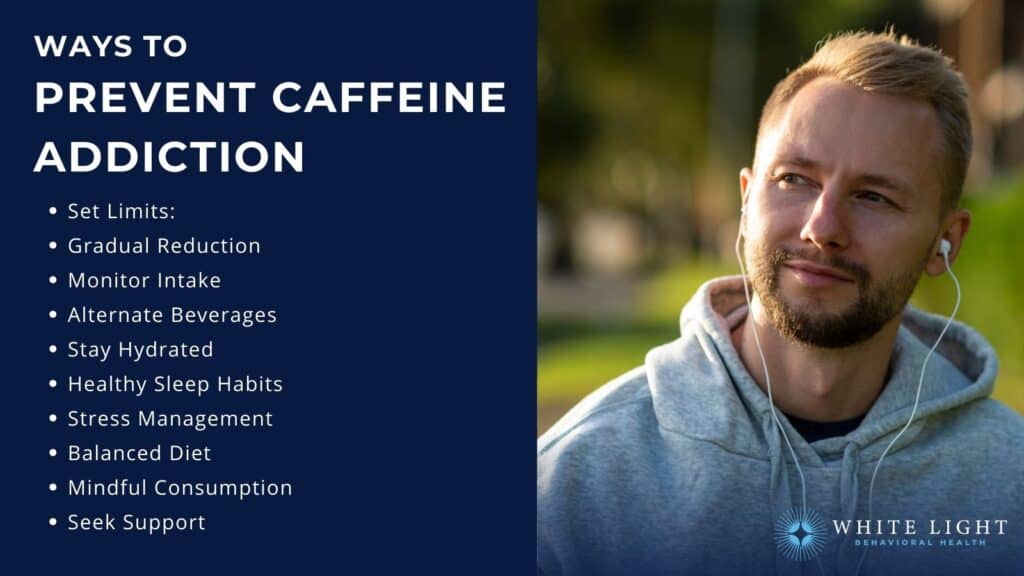
To prevent caffeine addiction, you should set daily intake limits, gradually reduce consumption if heavily reliant, prioritize adequate sleep with a consistent schedule, explore alternative stress management techniques like exercise or meditation, maintain a balanced diet, and seek support from a healthcare professional or support group if struggling.
Here are the strategies to prevent caffeine addiction:
- Set Limits: Establish a daily caffeine intake limit and stick to it. Be mindful of how much caffeine you consume from various sources throughout the day.
- Gradual Reduction: If you’re trying to cut back on caffeine gradually to minimize withdrawal symptoms.
Reduce your intake slowly over time. - Monitor Intake: Keep track of your caffeine consumption by reading labels and being aware of the caffeine content in beverages and foods.
- Alternate Beverages: Substitute caffeinated drinks with non-caffeinated alternatives like herbal teas, water, or fruit-infused beverages.
- Stay Hydrated: Drink plenty of water throughout the day to stay hydrated and reduce the urge to rely on caffeine for energy.
- Healthy Sleep Habits: Prioritize adequate sleep by maintaining a consistent sleep schedule and creating a relaxing bedtime routine.
Avoid consuming caffeine close to bedtime to improve sleep quality.
- Stress Management: Find alternative ways to manage stress and boost energy levels, such as exercise, meditation, or deep breathing exercises.
- Balanced Diet: Maintain a balanced diet rich in nutrients to support overall well-being and reduce the need for caffeine as an energy booster.
- Mindful Consumption: Be aware of why you consume caffeine, whether out of habit or necessity. Opt for caffeine-free options when possible.
- Seek Support: If you’re struggling to reduce or control your caffeine intake, consider seeking support from a healthcare professional or support group specializing in addiction or substance abuse.
How Do The Effects Of Caffeine Addiction Differ From Or Resemble Those Of Nicotine Addiction?
The effects of caffeine addiction resemble nicotine addiction in several ways but differ in severity.
Both substances create physical dependence through brain chemistry changes, leading to tolerance and withdrawal symptoms like headaches, irritability, difficulty concentrating, and mood changes when discontinued. However, nicotine addiction is more severe and persistent, with withdrawal symptoms lasting weeks compared to caffeine’s 2-9 day period.
While both affect neurotransmitter systems and create habitual use patterns, nicotine poses greater long-term health risks, including cancer and cardiovascular disease, whereas moderate caffeine consumption provides some health benefits. Nicotine creates stronger physical dependence and more intense cravings, making it significantly harder to quit than caffeine.
Rediscover Life at White Light Behavioral Health
Get the compassionate support you deserve. We're here to help you reclaim joy, wellness, and a brighter future.
Our Facility
How Does Caffeine Addiction Compare To Tobacco Addiction In Terms Of Symptoms And Health Effects?
Caffeine addiction and tobacco addiction both involve dependency on substances that stimulate the central nervous system, but they differ in their symptoms and health effects. Caffeine addiction typically leads to symptoms such as headaches, irritability, and fatigue when caffeine intake is reduced.
Long-term excessive caffeine consumption results in insomnia, digestive issues, and increased heart rate. Tobacco addiction, on the other hand, is associated with more severe health risks, including respiratory problems, cardiovascular disease, and various cancers.
Both addictions require different approaches for treatment, with caffeine addiction often managed through gradual reduction and behavioral changes, while tobacco addiction might involve nicotine replacement therapies and medications.
Can Caffeine Consumption Exacerbate Symptoms Of Alcohol Intolerance?
Caffeine consumption potentially exacerbates symptoms of alcohol intolerance in some individuals. Both caffeine and alcohol affect the body’s metabolism and cause dehydration, which intensifies the adverse reactions experienced by those with alcohol intolerance.
Additionally, combining caffeine and alcohol leads to increased heart rate and anxiety, further compounding the discomfort. Individuals with alcohol intolerance should monitor their caffeine intake and be mindful of how it interacts with their body’s response to alcohol.
How Long Does Caffeine Withdrawal Last?
Caffeine withdrawal lasts 2-9 days, with symptoms beginning 12-24 hours after cessation and peaking at 20-51 hours.
Where Can I Find Treatment For Caffeine Addiction In Ohio?
You will find treatment for caffeine addiction in Ohio through various healthcare providers, addiction treatment centers, and mental health facilities throughout the state. Treatment options for caffeine addiction include counseling, support groups, and lifestyle changes. You should seek help from healthcare professionals or addiction specialists who specialize in substance dependency and behavioral addictions.
Share This Post

